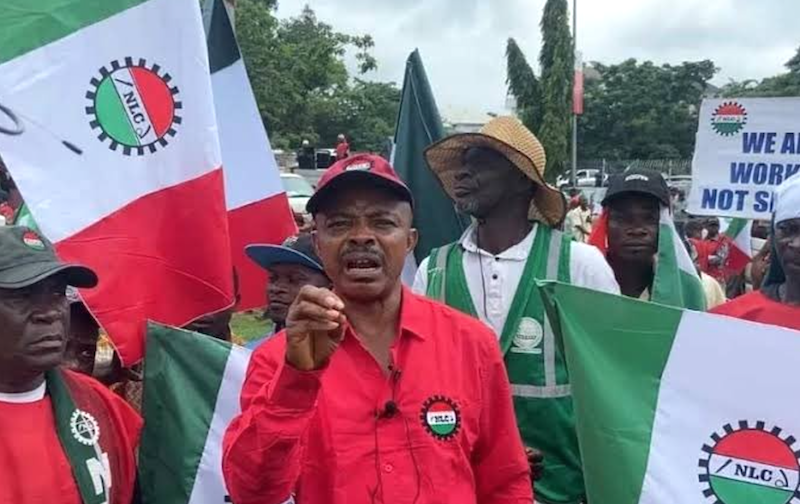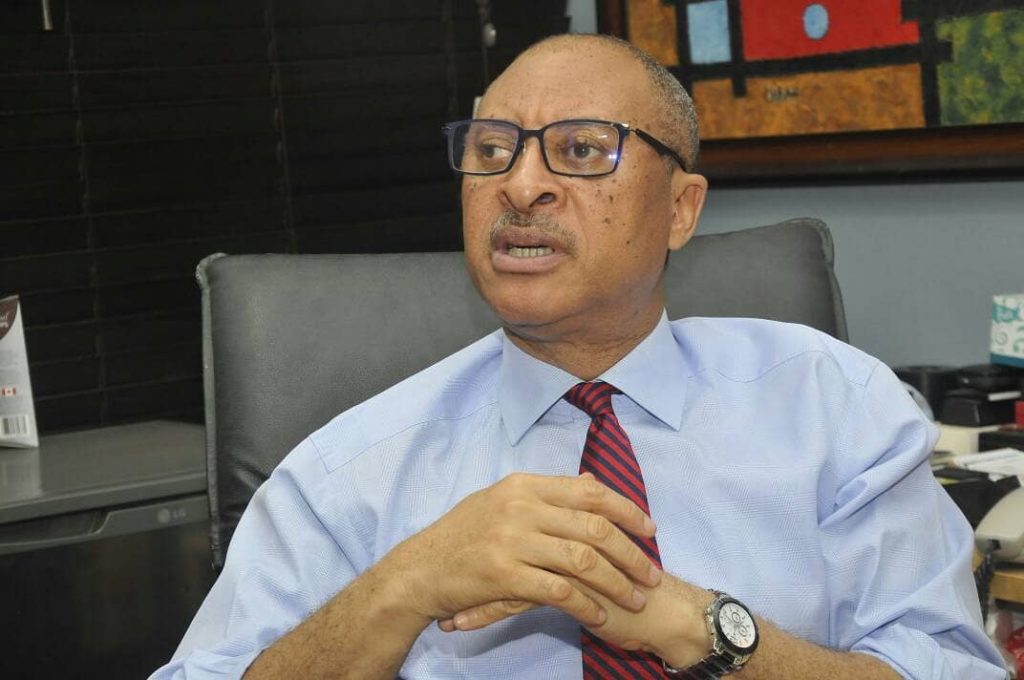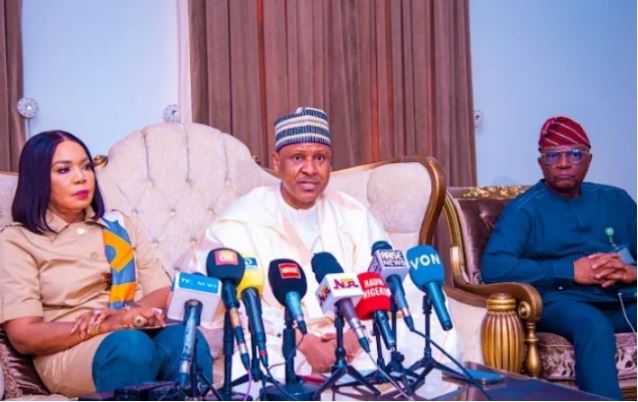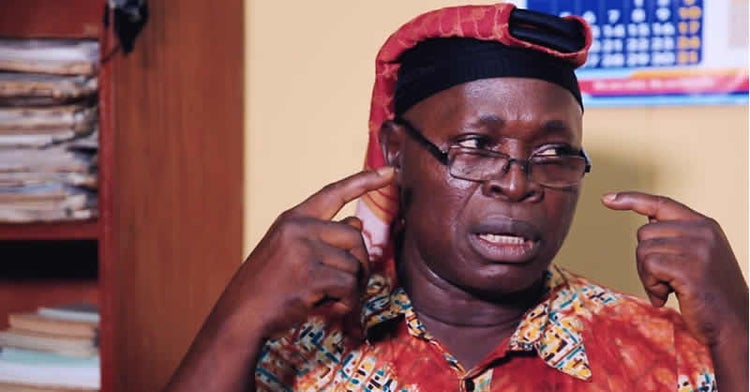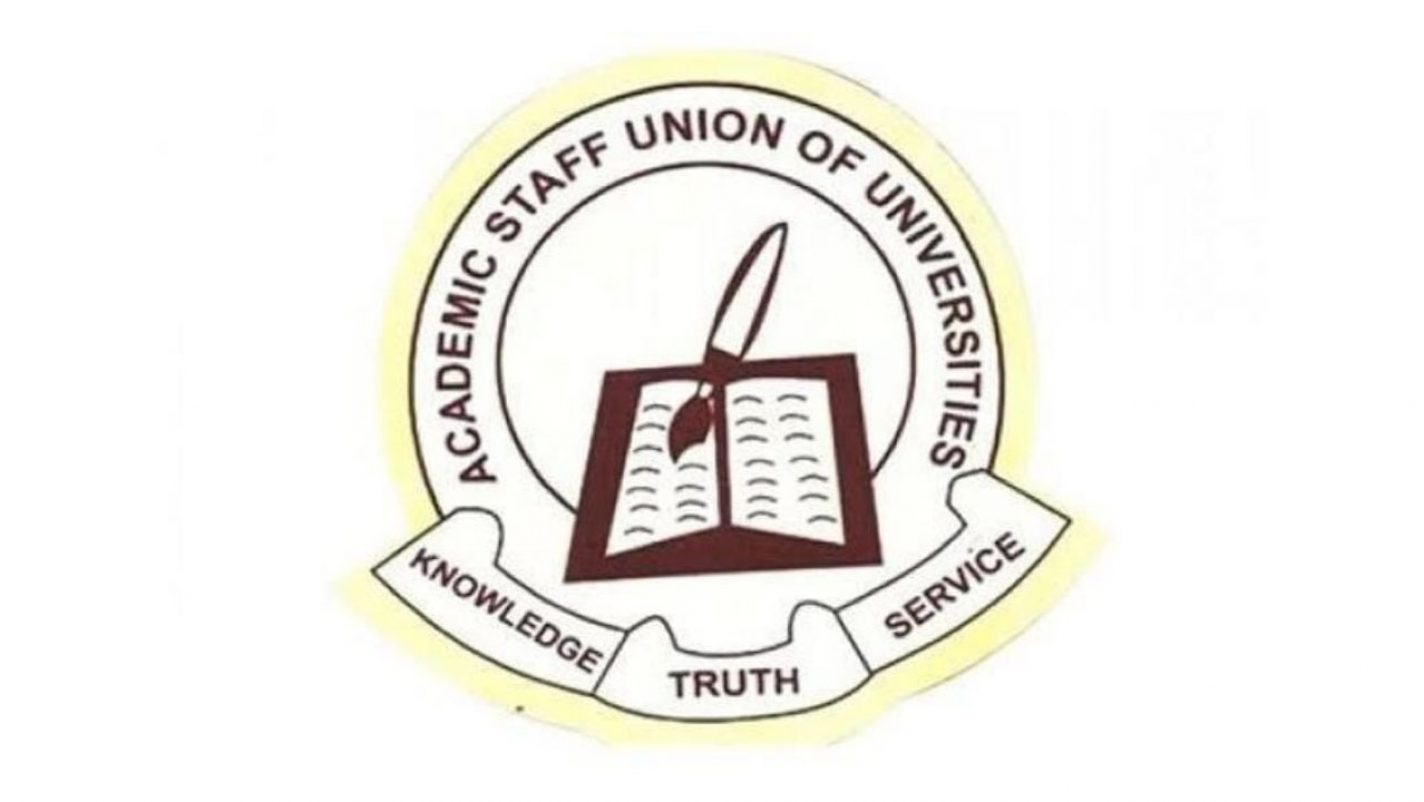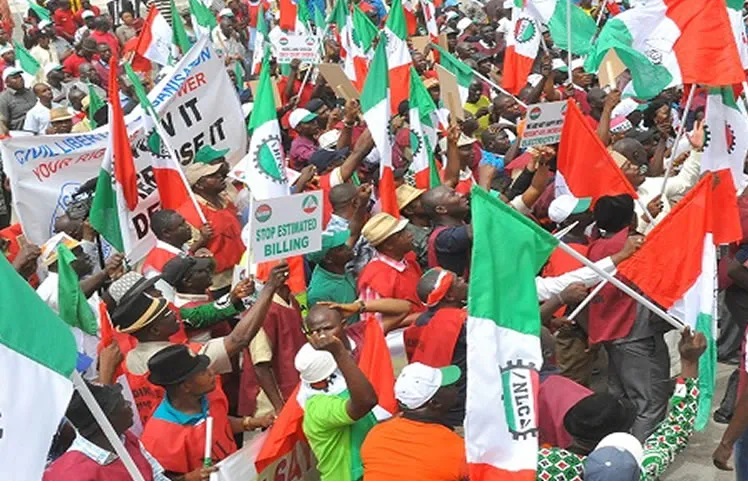All gloves seem to be off as organized labor leaders decided to unbraid Senator George Akume, Secretary to the Government of the Federation, SGF and leader of government’s team negotiating the minimum wage crisis with the organized labor leaders after they practically shut down our country last monday, 3rd June.
As the verbal exchange between the leaders of labor and government rages on and Nigerians are lapping up all the drama, what seems to have been lost on the nation is the gravity of and dire consequences of shutting down the national grid by the obviously enraged and therefore rampaging labor activists that were intent on bringing government down to its knees via a forced lock-down.
Has anyone considered a scenario whereby those that forcefully took control of critical and sensitive assets of our country are non state actors who have taken up arms against our country?
Think of a scenario whereby those that switched off our electricity grid were religious insurgents-Boko Haram, ISWAP that are holding sway in the northern region or sovereign state agitators like IPOB, ECN in the eastern flanks and Oodua Peoples Congress in the south west axis of our country or environmental rights activists like Niger Delta militants in the treasure trove of Nigeria?
Our country got very close to that apocalystic situation on 3rd June when organized labor embarked on industrial action to enforce their demand for minimum wage increase.
At the risk of being tagged an alarmist , the scenario described above is one of the teachable moments for me in the minimum wage increase agitation by the organized labor pitched against the federal government that is making frantic efforts to manage the crisis for an equitable solution.
To put things in perspective, it is apropos that we reflect on the aetiology of the minimum wage crisis.
The first to literally draw blood in the war of words was the SGF, Senator Akume whose verbal umbrage was triggered by the reported loss of some lives in hospitals country wide when labor activists forced their way into the national electricity grid to switch off power supply nationwide. That resulted in reported loss of lives of sick people that were on life support gadgets in hospitals, even as medical doctors that could have helped save lives were stopped from going into the hospitals to attend to patients. Ideally when strikes are called , those on essential duties are not prevented from working.
It is believed that the rampaging labor activists enforcing the industrial action that was called by the organized labor in Nigeria to force the hands of goverment to increase minimum wage from N30,000 to N500,000, which was the intial demand, but currently scaled down to N250,000, did cause avoidable loss of not only income,but the shut down resulted in loss of lives.
Although looses are still be counted, the two days shut down of our country stretched from the bureacracy to market/economic space all the way down to the airspace such as airports that were also shut down by the labor activists who were bent on causing massive disruption of the magnitude that would shake government.
Obviously, unbemused about the catatrosphic consequences of the strike action that resulted in a practical lock down of our country for at least 48 hours , the SGF accused labor leaders of economic sabotage and characterized their crime as treasonble felony.
The SGF, Senator Akume, reportedly expressed his displeasure when the executives from the National Council of Christian Association of Nigeria,CAN visited him last thursday,June 6.
Below is how an obviously piqued SGF expressed his displeasure:
“Nowhere in the world has labour ever tampered with the national grid. It is treason! Treasonable felony is economic sabotage; you don’t do that,” .
“We are trying to rebuild the economy. The president is picking it up, and they want to destroy it. Of what use is that to all of us? That is not the way.”
He concluded by saying:
“It is not that we are not working. We are working, and that is why we implemented the N35,000 wage, which is more than the minimum wage,” he said.
“There are buses ready to be distributed, and soon, rice and other essentials will be available.”
Not taking the SGF’s umbraiding lying low, the leaders of organized labor have gone ballistic by pushing back via their mocking of the SGF by alleging that politicians , which is the ‘tribe’ that the SGF belongs are the real ecomomic saboteurs:
“The SGF we are sure clearly knows those whose actions are treasonable and sabotages our economy. Those who loot our treasury around the country, those who divert public resources meant for hospitals and schools; those who are involved in foreign exchange roundtripping; padding of budgets and inflating contracts including those who steal trillions of naira in the name of subsidy are the real economic saboteurs who commit treasonable felony.
“These people are in costly agbada and drive in convoys all around the nation occupying the corridors of power and not innocent workers who are not slaves but chose to withdraw their services because of the inhuman treatment meted on them by the government”.
The thirty six (36) state governors that are leading the components of the country at the subnational level, all of which together constitute Nigerian nation, who felt like , to borrow a popular local cliche, that their hair was being shaven behind their back; in the sense that a national minimum wage which would be binding on them to pay workers at the state level was being discussed and decided without their input, had to join the fray.
In their statement they expressed the following concern:
“The Nigeria Governors’ Forum is in agreement that a new minimum wage is due. The Forum also sympathises with labour unions in their push for higher wages.
“However, the Forum urges all parties to consider the fact that the minimum wage negotiations also involve consequential adjustments across all cadres, including pensioners. The NGF cautions parties in this important discussion to look beyond just signing a document for the sake of it; any agreement to be signed should be sustainable and realistic.
“All things considered, the NGF holds that the N60,000 minimum wage proposal is not sustainable and can not fly. It will simply mean that many states will spend all their FAAC allocations on just paying salaries with nothing left for development purposes. In fact, a few states will end up borrowing to pay workers every month. We do not think this will be in the collective interest of the country, including workers.”
Expectedly , the governors have also become targets of the fiery darts and missiles of the angry labor unions.
They wrote:-
“We do believe that governors have acted in bad faith.lt is unheard of for such a statement to be issued to the world in the middle of an ongoing negotiation. It is certainly in bad taste.
“As for the veracity of their claim, nothing can be further from the truth as FAAC allocations have since moved from N700 billion to N1.2 trillion( thanks to subsidy petrol and naira subsidy removal by president Tinubu) making the governments extremely rich at the expense of the people.”
Furthermore they bellowed:
“We are not fixated with figures but value.
Those who argue that moving national minumum wage from N30,000 to N60,000 is sufficiently good enough miss the point.”
As the popular aphorism goes ‘a hungry man, is an angry man’.
There is no arguement about the fact that Nigerian workers have been negatively impacted by the reform initiatives of the incumbent administration.
Even President Tinubu acknowledges that fact, hence he provided an interim remedial measure, which is the Federal Government award of N35,000 (strangely it is not being talked about very much ) as extra bonus on the N30,000 minumum wage to workers pending when the amount to replace the one that has recently expired, is agreed upon.
All over the world, labor union leaders have the reputation of being feisty,fiery and ferocious.
For instance , in the
United States of America,USA, the highly influential and powerful United Auto Workers , UAW have been known to engage politicians in hot exchange of words when demanding for wage increase.
The last showdown between UAW and their employers was in 2023 when they were demanding for 40% wage increase. Owing to the fact that the union is very influential and pack a significant voting punch, the current President of the US, Mr Joe Biden joined them in the picket lines and backed their agitation for pay increase.
Unlike in the US where the private sector is often the largest employer of labor , in Nigeria, government is the highest employer of labor, so strike actions are often taken against the private sector employers of labor which is a tell tale sign of the abysmal level of industrialization in our country.
In the United Kingdom,UK, Baroness Margaret Thatcher, who Britons aptly tagged the Iron Lady owing to how she was able to tame the very vocal and influential labor unions, that could significantly influence the outcomes of political parties elections and as they were holding British politicians to a ransome, was hounded until her passage on 8th April 2013 and she was even disrespected by labor activists during her funeral.
From the narrative above, labor activists all over the world are known to be impetulent and tempestous.
Having put things in context, to give readers the opportunity to make a fair assessment of the crisis triggered by the negotiqtion for a new minimum wage characterized by hot verbal exchanges between the SGF and organized labor currently happening in Nigeria: and the carpeting of governors by labor leaders, after the governors forum reminded the negotiators that state governments may not be able to pay the wage being demanded; let us examine the veracity of the accusation leveled by the SGF against the labor leaders that they have committed treasonable felony by switching off the national electricity grid which he pointed out as having not been done anywhere in the world.
On the other hand ,what also needs to be tested for veracity by being put in the crucible of truth are the charges against politicians at both federal and sub national levels by the labor leaders who are claiming that they did no wrong by plunging the nation into total darkness to drive home their demand for increase in minimum wage for workers and then accussed politicians of being the real economic saboteurs.
So, l posed the question of whether the switching off of electricity from the national grid was a treasonable felony using Artificial Intelligence, AI tool, and below is the response:
“Labor unions do not have the right to switch off the national electricity grid as a form of strike protest. While labor unions have the right to peaceful strike actions, sabotaging or tampering with critical infrastructure like the national electricity grid is illegal and potentially dangerous.
Such actions could lead to serious consequences, including:
– Endangering public safety
– Causing widespread economic disruption
– Damaging equipment and infrastructure
– Violating labor laws and regulations
Instead, labor unions typically engage in peaceful strike actions like:
– Work stoppages
– Picketing
– Rallies
– Negotiations
Unions may also explore other creative and lawful tactics to draw attention to their demands, like social media campaigns or public outreach efforts.”
In light of the forgoing, the SGF is right in his allegation that organized labor might have committed treasonable felony by switching off the national electricity grid because it has had grave consequences on the economy of Nigeria and lives of Nigerians.
Given the reality above, should the ongoing negotiation between governmemt led by a justifiably miffed SGF and labor leaders fail to attain success before the expiration of the one week period of forbearance granted by organized labor when it suspended the strike for one week which ends tuesday 12, June 2024; in order to prevent a re-occurence of the treasonable felony offenses that occured on 3rd June ,should government not take steps to protect our critical assests like the national electricity grid, telephone networks, water reservoirs, airports and sea ports amongst many other such critical infrastructure to make them as impregnable as fortknox to protect them from being easily breached as had happened on 3rd June?
The second teachable moment from the minimum wage negotiation to me is whether the labor leaders are correct in labeling politicians as the ‘real’ saboteurs when they made the statement.
As l have always advocated, and in alignment with the title of my column which is also what l titled my latest book: “Leading From The Streets”, mass media platforms are sort of public opionon courts where everyone is free to act as litigants and appellants, as the case may be.
Put succinctly,we all have the right to present our cases in the courts of public opinion as lawyers do in courts of law.
After pleading our case, it is left for the people of Nigeria, particularly those leading from the streets to make the decision in the way that judges do in law courts.
That is one way in which we will be putting the masses who are Leading From The Streets in the centre-point of leadership.
Ideally,that is the way it is supposed to be as it would be in consonnance with the tenets of and in alignment with the definition of democracy which is: government of the people,by the people and for the people.
Arising from the above, and in the spirit of putting leadership in the hands of the people, it is only proper that we scrutinize the allegation by labor leaders that politicians are the ‘real’ economic saboteurs.
Going by the fact that Mr Ahmed Idris ,a suspended Accountant General of the Federation who is a public servant and not politician was arrested and araigned by the Economic and Financial Crimes Commission, EFCC for allegedly stealing a whooping N109 billion naira from government treasury between february and december 2021,the allegation against politicians is rendered spurious. That is because the claim by labor leaders that politicians are the ‘real’ economic saboteurs is disputable.
One is also curious to know if our labor leaders are also implying that civil servants are the ‘fake’ saboteurs, if politicians are the ‘real’ saboteurs ?
Before Ahmed Idris, another Accountant General of the Federation that Idris suceeded in office is Mr Jonah Otunla.
He is another civil servant, not a politician who served as Accountant General of the Federation between 2011 and 2015 and was also alleged to have stolen about N26 billion from federal government treasury.
But he refunded about N6.3 billion after being arrested by the EFCC and he has been in court trying to make a case that having made a refund of some of the looted funds,he has been discharged of all criminal and civil liabilities.
How about Abdulrasheed Maina, that was a public servant heading the defunt pension reform department of government?
He was given the mandate to sanitize the pension fund space that had become a cesspit of corruption but he relooted what he had recovered from looters and was convicted in november 2021 for stealing 2 billion naira belonging to pensioners after a two-year trial.
As adumbrated by one Sanusi Muhammad who in a piece published in Trojan News of 3rd december 2023, wherein he identified a litany of acts of economic sabotage via financial corruption perpetrated,not only by politicians,but also by civil servants,it is clear that civil servants are not absolved from being economic saboteurs.
In fact from available records, civil servants are as culpable as politicians that they are pointing their fingers at.
So, is this a case of the kettle calling the pot black?
In any case, is it not telling that the indicted and convicted civil servants highligted earlier are members of the ‘tribe’ of the organized labor comprising of the umbrella body of civil servants-the Nigeria Labor Congress ,NLC and Trade Union Congress,TUC headed by Joe Ajaero and Festus Osifo who have been voiceferous in tagging politicians at both national and subnational levels as economic saboteurs?
It is trite, but it is worth recalling the fact that the indicted and convicted civil servants are actually colleagues of the labor leaders that are expressing righteous indignation.
The truth and sad reality is that we are all swimming in the cesspool of corruption that equates with economic sabotage, so there is no need expressing righteuors indignation of only condemning corruption when agitating for pay rise.
How about our labor leaders becoming more innovative by creating anti corruption vanguards/squads in government institutions to nip the crime in the bud?
As the conventional wisdom goes.
‘Corruption steals from us all’.
Is it not hypocritical that the Institutions listed below and managed by civil servants are ridden with corruption?
They range from the Niger Delta Development Commission , NDDC, Nigeria Social Insurance Trust Fund,NSTIF, to Universal Basic Education Commission,UBEC and Nigerian National Petroleun Company, NNPC , Niger Delta Amnesty Funds, as well as the Central Bank of Nigeria, CBN .
It is dishonorable that all of the public agencies listed above have been associated with humungous fraud in the past several years.
Let it be reiterated that they are being led by public/civil servants who have been engaging in economic sabotage.
These are crimes which they try to cover up by making incredulous claims such as termites eating up invoices and snakes swallowing missing funds.
Again , is it not rather hypocritical that there is no evidence that labor leaders reprimanded , condemned how much more sanctioned in any shape or form the referenced economic saboteurs within their ranks that have been indicted or convicted?
Yet they are lambasting politicians for rejecting their initial scandalous demand for N500,000 as minimum wage for workers instead of focusing more on how the currently very low productivity base in our country could be boosted through investements in infrastructure such as electricity energy generating projects like Geometric Power providing electricity solution in Aba,Abia state, Innoson Vehicles Manufacturer in Nnewi , Anambra state as well as Dangote refinery in Lekki, Lagos etc, to facilitate industrialization of our country that woud led to the creation of more jobs and prosperity for workers.
To be clear, one is not holding brief for the members of the political class, or in any way trying to absolve them of their culpabilty in corrupt practices that expose our dear native land to economic sabotage. But l am simply drawing attention to the fact that the allegations by labor leaders that politicians are the ‘real’ saboteurs is spurious and malicious because it is a case of the kettle calling the pot black.
In my view, the vitriolic exchanges are unhelpful and mischevious and at best diversionary.
Instead of chasing the shadows which the grandstanding by organized labor amounts to, they should invest more energy in identifying and addressing the primary cause/causses of the spike in the cost of living of which one of them is food insecurity and the other is due to ongoing economic reforms.
That brings me to the 3rd teachable moment which revolves around the law governing national minimum wage negotiations.
It would need to be reviewed because as it currently stands it negates the spirit and letter of true federalism since it empowers the federal government to pass national minimum wage , precluding state governments from fixing their minimum wage based on the resources available in the economy to support low or high wage.
For instance, would it not be foolhardy for Lagos state that earns Internally Generated Revenue , IGR in excess of N260 billion annually pay the same minimum wage to workers in Zamfara, Ekiti or Ebonyi states with little or no economic activities from which revenue could be derived as tax?
Obviously the high cost of living in Lagos ( food, housing ,transportation etc) which is the economic heart beat of Nigeria, can not be compared to that of people living in the aforementioned states in the hinterlands of Nigeria which are rural with much lower costs . So it would be understandable if the workers there are paid less. Is uniform minimum wage nationwide not an aberration of autonomy which defines true federalism?
For instance , would US law makers pass a law that the minimum wage in the highly industrialized and populous states of California and New York should be the same paid to workers workers in less urbanized states such as Mississippi, Lousiana or New Mexico?
The resounding answer is no!
That is because since the size of their economes are much smaller and weak, they would not find the funds to pay salaries as high as workers are paid in California and New York states that have robust economic bases.
A similar comparism can be made locally between Lagos, Rivers, Akwa lbom,Delta and Ogun states that are financially bouyant versus, Ekiti, Zamfara and Ebonyi states that are barely surviving on the lean revenue from FAAC , as they generate little or no revenue internally.
Clearly, fixing a national minimum wage that is binding on all the component states that constitute Nigeria would vitiate the concept of autonomy that is the underguarding principle of democracy and which would contradict the concept and practice of true federalism which is central to the practice of presidential system of government that is in operation in our country.
Arising from the above, the national mininum wage provision in section 4 of the 1999 constition of Nigeria would appear to be an aberration or a contradition of the concept and practice of true federalism which our nation prides herself as practicing.
As such,that provision for fixing a national minimum wage in section 4 of the 1999 constitution would need to be revisited with a view to tweaking or expunging it to reflect the dynamics of autonomy intrinsinc in the practice of true federalism as it obtains in the US from where we borrowed the presidential system.
There are several other teachable moments that one has gleaned from the ongoing minimum wage umpasse that my good friend Segun Adeniyi , the editorial board chairman of Thisday newspaper has titled: “ Minimum Wage and Maximum Rage” in his column last week,but time and space would not permit my laying all of them out in this piece.
Be that as it may, inflation in Nigeria, especially of the food hue has hit an all time high which is in excess of 40%.
Obviously the N30,000 minimum wage plus the N35,000 hardship/bonus pay introduced by President Tinubu to cushion the negative fall out of the ongoing socio-economic reforms has not been good enough antidote to the current galloping inflation.
What elementary economics teaches us is that inflation sets in when a lot of money is chasing few goods.
Bearing that in mind, what needs to be done, in my humble opinion is increase the productive/production base of our economy.
Of course one is aware of dollar scarcity and exit of some multinational mamufacturing firms with low capital threshold from our country.
So, one is not being too bullish about improvements in manufactured products being abundant until the volatility in the financial sector particularly with reepect to foreign exchange rate and crude oil sales are better managed.
But targeting food inflation that has been skybound,it appears to me that one of the ways to tackle the hardship being experienced by workers would be to boost food security which is currently like a mirrage in light of the high level of insecuriy driven by non state actors-religious insurgents, bandits and separatists/ soveriegn state agitators that have heightened insecurity and made made farming either as a profession or vocation very difficult,if not impossible.
Since professional farming is currently highly risky in light of how Boko Haram, a couple of years ago gruesomely beheaded some farmers in Sokoto state who defiled their order not to go to farm, vocational farming in gardens around the homes of workers remains a good option to augument food supply that is fast drying up.
Therefore, a pertinent question to ask is: are our labor leaders considering a solution to the hardships from the prism highlighted above?
Why must money or wage increase be the only optics from which solution to current hardships is being considered?
Are our labor leaders not aware that even if the N250,000 minimum wage that they are agitating for is agreed,in less than 3 months, all things being equal, inflation would catch up with the wage increase even if it is as high as the N500,000 that is their original demand?
My humble counsel would be that workers should weigh all the options available and find a middle ground,even as l urge them to regard government as partners in progress not adversaries as evidenced by the barbs that they are currently being traded with government functionaries, including those in the two branches-executive and legislative.
Even government afficionados at both national and subnational levels have not escaped the tongue lashing by organized labor operatives, which is unfortunate because it is making our beloved country look like a theatre of the absurd to onlookers,both locally and internationally.
How antagonizing the negotiators and excalating the crisis would bring succur to the workers bearing the brunt remains unfathomable to me.
On the part of government , restoring security by reining in the outlaws that are putting lives at risk and making farming difficult, if not imposible should be priotized.
One is assuming that President Tinubu is on top of how to resolve the intolerable insecurity issues in our country, and positive result is yet to manifest in that sector, probably because he is rejiging the nation’s security strategy that has been driven from a kinetic approach which entails applyiing sheer military force as solution.
But hope for a respite seems to be on the horizon given that government is throwing in a mix of both kinetic and non kinetic strategies (which is about engagement with the society in more scientific methods) such as carrots and sticks approach to get to the route cause of the anti-social bevaviors manifesting as the menance currently hobbling the growth, development and progress of our beloved nation as well as prosperity of Nigerians.
To make our country great,our labor leaders must transit from being mere workers to problem solvers by becoming a source of innovation and a bastion of productive workforce that would propel our country into ultimately attaining a level of human, food and energy security that have been the dream of the masses which our leaders have been struggling to make manifest.
Magnus Onyibe,an entrepreneur,public policy analyst ,author,democracy advocate,development strategist,alumnus of Fletcher School of Law and Diplomacy,Tufts University, Massachusetts,USA and a former commissioner in Delta state government, sent this piece from Lagos, Nigeria.
To continue with this conversation and more, please visit www.magnum.ng

